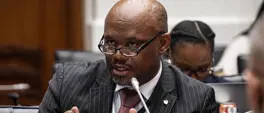SACP defends SANDF chief Maphwanya over his Iran comments
Nokukhanya Mntambo
18 August 2025 | 4:17Rudzani Maphwanya was at the centre of a diplomatic storm last week, when Iranian media reported that he appeared to publicly co-sign South Africa to stronger political and military ties with Tehran.
- South African Communist Party (SACP)
- South African National Defence Force (SANDF)
- Rudzani Maphwanya
- Department of International Relations and Cooperation (DIRCO)
- Iran

FILE: General Rudzani Maphwanya addressed the annual global commemoration of the International Day of United Nations (UN) Peacekeepers in De Brug Army Base in Bloemfontein on 29 May 2025. Picture: Simphiwe Nkosi/EWN
JOHANNESBURG - The South African Communist Party(SACP) has hit back at critics of defence force chief, Rudzani Maphwanya, for his remarks during a recent visit in Iran.
Maphwanya was at the centre of a diplomatic storm last week, when Iranian media reported that he appeared to publicly co-sign South Africa to stronger political and military ties with Tehran.
It’s understood that he said that Iran's military had significant capabilities that could be used in cooperation with the South African armed forces to serve mutual national interests and enhance regional and international security.
READ: Presidency says action will be taken against SANDF's Maphwanya over his Iran comments
Despite mounting pressure to account for his comments, the SACP has come to out in defence of Maphwanya.
A few months ahead of his retirement, South African National Defence Force chief, Maphwanya, is now facing calls to step down over his comments.
The SACP has since come out batting for him in what the party labelled as anti-Iran hysteria and geopolitical hypocrisy.
In a statement released at the weekend, the SACP said that South Africa’s ties with Iran were not out of the ordinary.
The Department of International Relations and Cooperation (DIRCO) distanced itself from Maphwanya’s comments, saying they did not reflect South Africa’s foreign policy.
President Cyril Ramaphosa called Maphwanya’s comments ill-advised.
The SACP said thats government’s muddled response was concerning, accusing government of scapegoating the SANDF chief.
It said that giving into the whims of Iran’s foes to appease other countries sets a bad precedent.
Get the whole picture 💡
Take a look at the topic timeline for all related articles.















